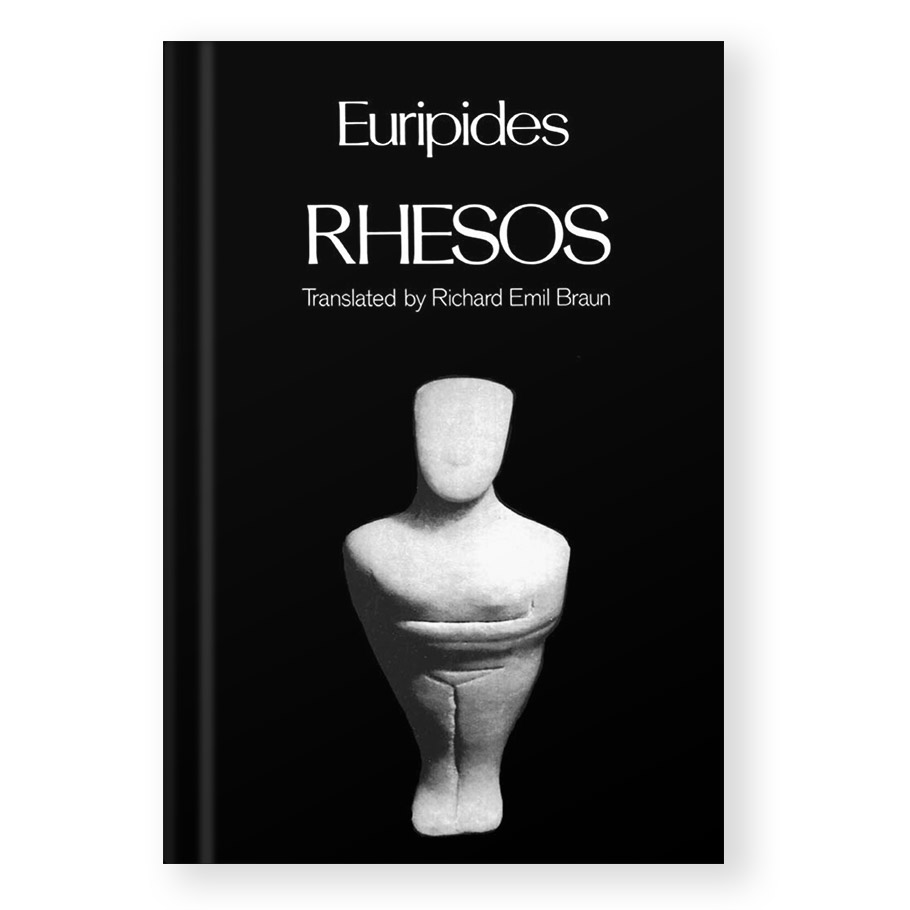دانلود کتاب Rhesos (Greek Tragedy in New Translations) by Euripides, Richard Emil Braun
The story of a futile quest for knowledge, this ancient anti-war drama is one of the neglected plays within the corpus of Greek tragedy. Euripides’ shortest tragic work, Rhesos is unique in lacking a prologue, provoking some scholars to the conclusion that the beginning of the play has been lost. In this exciting translation, Rhesos is no longer treated as a derivative Euripidean work, but rather as the tightly-knit tragedy of knowledge it really is.
دانلود کتاب:
Rhesos (Greek Tragedy in New Translations) by Euripides, Richard Emil Braun
نویسنده: (Euripides, Richard Emil Braun)
The story of a futile quest for knowledge, this ancient anti-war drama is one of the neglected plays within the corpus of Greek tragedy. Euripides’ shortest tragic work, Rhesos is unique in lacking a prologue, provoking some scholars to the conclusion that the beginning of the play has been lost.
In this exciting translation, Rhesos is no longer treated as a derivative Euripidean work, but rather as the tightly-knit tragedy of knowledge it really is. A drama in which profound problems of fate and free will come alive, Rhesos is also an exploration of the perversion of values that come as the result of war. Charged with a striking immediacy, this play is contemporary in the questions it raises, and eternal in its quest for truth.
پیش نمایش کتاب
Goodreads users review :
Devil’s in the details for this one.
My fellow military fans, you will know from page 1 that the Trojan army is screwed. And there’s one peculiar thing about the words of the Muse:
And thou, Athena—nothing was the deed Odysseus wrought this night nor Diomede— ‘Tis thine, all thine; dream not thy cruel hand Is hid from me! Yet ever on thy land The Muse hath smiled; we gave it praise above All cities, yea, fulfilled it with our love. The light of thy great Mysteries was shed By Orpheus, very cousin of this dead Whom thou hast slain; and thine high citizen Musaeus, wisest of the tribes of men, We and Apollo guided all his way: For which long love behold the gift ye pay! I wreathe him in my arms; I wail his wrong Alone, and ask no other mourner’s song.
The Chinese translation’s last two line reads like “we shall never bless you (Athena, and her city Athens) with another philosopher”. Now I’m just dying to know how the original text reads because Socrates was weeping in the corner. Poor guy got bullied by someone — is it Euripides or the Chinese translator?
——————————
Update: the Chinese translator is innocent. Another translation settles the dispute:
This was your doing, Athena; you alone are to blame for his death —neither Odysseus nor the son of Tydeus 940 had anything to do with it—do not think it has escaped my eye. And yet we sister Muses do special honor to your city, your land we chiefly haunt; and those dark mysteries with their torch processions were revealed by Orpheus, cousin of this dead man 945 whom you have slain. Musaeus, too, your holy citizen, of all men most advanced in lore, was trained by Phoebus and us, the nine sisters. And here is your reward for this; in my arms I hold my child and mourn for him. I’ll bring to you no other learned man.Devil’s in the details for this one.
My fellow military fans, you will know from page 1 that the Trojan army is screwed. And there’s one peculiar thing about the words of the Muse:
And thou, Athena—nothing was the deed Odysseus wrought this night nor Diomede— ‘Tis thine, all thine; dream not thy cruel hand Is hid from me! Yet ever on thy land The Muse hath smiled; we gave it praise above All cities, yea, fulfilled it with our love. The light of thy great Mysteries was shed By Orpheus, very cousin of this dead Whom thou hast slain; and thine high citizen Musaeus, wisest of the tribes of men, We and Apollo guided all his way: For which long love behold the gift ye pay! I wreathe him in my arms; I wail his wrong Alone, and ask no other mourner’s song.
The Chinese translation’s last two line reads like “we shall never bless you (Athena, and her city Athens) with another philosopher”. Now I’m just dying to know how the original text reads because Socrates was weeping in the corner. Poor guy got bullied by someone — is it Euripides or the Chinese translator?
——————————
Update: the Chinese translator is innocent. Another translation settles the dispute:
This was your doing, Athena; you alone are to blame for his death —neither Odysseus nor the son of Tydeus 940 had anything to do with it—do not think it has escaped my eye. And yet we sister Muses do special honor to your city, your land we chiefly haunt; and those dark mysteries with their torch processions were revealed by Orpheus, cousin of this dead man 945 whom you have slain. Musaeus, too, your holy citizen, of all men most advanced in lore, was trained by Phoebus and us, the nine sisters. And here is your reward for this; in my arms I hold my child and mourn for him. I’ll bring to you no other learned man.
۸۳۱۴
rated it: 5.0 from 5.0
If not Euripides, then Who? 6 October 2018 One annoying thing about this play is that when I typed the name into Goodreads I ended up with a whole heap of books on monkeys. The other thing is that this particularly ancient Greek tragedy seems to be rather obscure. I would say that it was written by Euripides but it turns out that there is an awful lot of doubt as to his authorship. In fact it seems as if the only reason it had been lumped with his works is because the original compilers simply assumed that it was one of his. The problem is that there is debate, even now, as to whether he wrote it, though the fact that we have it suggests that there might be some credence because it would have come down to us as a part of the volume of Euripedan plays that managed to escape the destruction of the ancient world. The play is set during the Trojan War, though if I hadn’t had mentioned that and you guessed then chances are that you would have been right, namely because out of all of the settings of the plays that we have, the Trojan War, and the events surrounding it, seem to be pretty common. Then again, the subject seemed to be pretty popular among the Greeks, and I suspect that that probably had a lot to do with Homer and his writings, though no doubt they would have had access to a lot of other things that we don’t have access to. So, the play is set during one of the scenes in the Iliad, where Odysseus is going on a scouting mission into the Trojan camp. At the same time Rhesus, the king of Thrace, arrives to assist the Trojans. However, the Trojan’s aren’t all that happy because the Thracians basically took their time to turn up. Well, Rhesus has an excuse of his own, namely that he happened to be fighting his own war with the Scythians, and they couldn’t spare any troops to assist the Trojans. Anyway, Odysseus rocks up, and is about to kill Hector, when one of the pesky gods (Athena) gets in the way and tells him that he can’t kill Hector, but he can go to town on Rhesus, which he does. That’s a rather interesting event, the fact that the deus-ex-machina happens in the middle of the play as opposed to the end, which is what one would expect in Euripides’ plays. It also turns out that Rhesus is the child of a muse, who is rather upset that her son has been killed, and desires to exact revenge on all those involved. Hmm, it seems that Odysseus has added another divine enemy to the list of divine enemies that seems to be lining up waiting to exact some form of punishment on him. I can’t say that this was a particularly delightful play, but it is one that I can now add to the collection that I’ve read. Mind you, the only version that I have of it happens to be a part of a collection that was given to me by some lady at church, namely because she didn’t feel that this particular collection would be appropriate to send to Africa to form a part of a school. I’d probably disagree, considering the library of one of the Bible Colleges that I did a couple of subjects at had some very interesting books amongst their collection. Then again, some Christians seem to want to censor any works that don’t line up with their own doctrine – Harry Potter comes to mind, as does a number of other works of literature. However, the whole Euripidean authorship is something that intrigues me, which is why I suspect it was never included among the Penguin collections that I happen to have. If it was Euripidean, then so be it, but if it wasn’t, it actually adds to our collection of playwrights from the ancient world. The problem is that we don’t know who wrote it, or when it was written. It could quite well have been written during that period of Athenian history when the empire was in decline, and the great playwrights had become a distant memory. Maybe the author wanted it to be attributed to Euripides, just in case it survived, or maybe was using Euripides’ plays as a template to write his own. In fact, it could be the case that the only reason the plays of the great Tragedians survived was because they were actually written down and kept, where as the lesser known playwrights were forgotten, simply because the plays were not transcribed to paper, and like the Doctor Who episodes of old, were thrown out because they needed the space.David Sarkies
rated it: 3.0 from 5.0
| نویسنده | Euripides, Richard Emil Braun |
|---|---|
| سال | 1992 |
| شابک | 9780195072891 |
| زبان | English |
| فرمت فایل | |
| تعداد صفحات | 112 |
دانلود کتاب Rhesos (Greek Tragedy in New Translations) by Euripides, Richard Emil Braun
68,000تومان
- خرید و دانلود آنی کتاب
| نویسنده | Euripides, Richard Emil Braun |
|---|---|
| سال | 1992 |
| شابک | 9780195072891 |
| زبان | English |
| فرمت فایل | |
| تعداد صفحات | 112 |
محصولات مرتبط
-
دانلود کتاب Aristophanes An Author for the Stage by Carlo Fer Russo
68,000تومان افزودن به سبد خرید -
دانلود کتاب Octavia A Play Attributed to Seneca by Lucius Annaeus Seneca
68,000تومان افزودن به سبد خرید -
دانلود کتاب Greek Tragic Theatre (Theatre Production Studies) by Rush Rehm
68,000تومان افزودن به سبد خرید -
دانلود کتاب Aeschylus The Oresteia (Landmarks of World Literature (New)) by Simon Goldhill
68,000تومان افزودن به سبد خرید
















نقد و بررسیها
هیچ دیدگاهی برای این محصول نوشته نشده است.